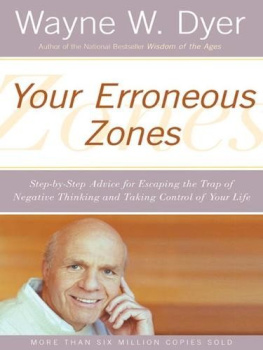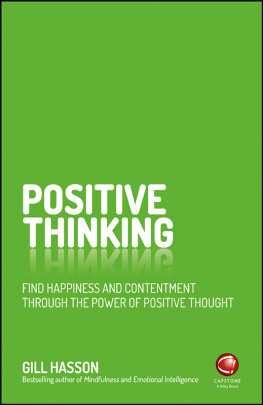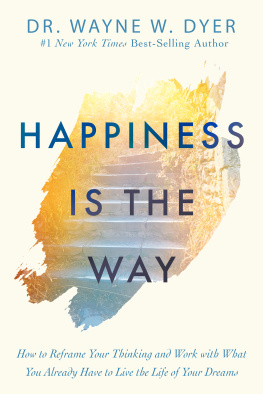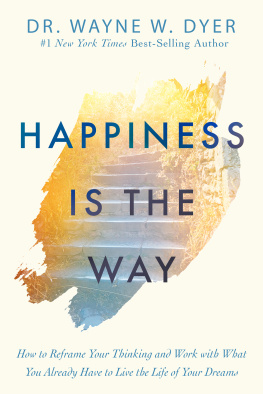Wayne W. Dyer
about in these pages.
The whole theory of the universe is directed unerringly to one single individualnamely to You.
A speaker stood before a group of alcoholics determined to demonstrate to them, once and for all, that alcohol was an evil beyond compare. On the platform he had what appeared to be two identical containers of clear fluid. He announced that one contained pure water and the other was filled with undiluted alcohol. He placed a small worm in the container while everyone watched as it swam around and headed for the side of the glass, whereupon it simply crawled to the top of the glass. He then took the same worm and placed it in the container with alcohol. The worm disintegrated right before their eyes. There, said the speaker. Whats the moral? A voice from the rear of the room said quite clearly, I see that if you drink alcohol, youll never have worms.
This book has a lot of worms in itmeaning, you will hear and perceive exactly what you want to hear based upon many of your own values, beliefs, prejudices and personal history. Self-defeating behavior and the ways to overcome it are touchy areas to write about. Looking at yourself in depth with an eye toward changing might be something that you say you are interested in accomplishing, but your behavior often speaks otherwise. Change is tough. If youre like most people, every fiber of your being will resist having to take on the hard work of eliminating the thoughts that support your self-forfeiting feelings and behavior. But despite the worms I think you are going to like this book. I love it! And I loved writing it.
While I do not believe that mental health should be treated in a flip manner, neither do I support the notion that it must be a humorless enterprise, filled with arcane jargon. I have tried to avoid intricate explanations, largely because I do not believe that being happy is a complex affair.
Being healthy is a natural state, and the means for achieving it are within the grasp of each one of us. I believe that a judicious mixture of hard work, clear thinking, humor and self-confidence are the ingredients of effective living. I do not believe in fancy formulas, or historical excursions into your past to discover that you were harshly toilet trained and that someone else is responsible for your unhappiness.
This book outlines a pleasant approach to achieving happinessan approach that relies on responsibility for and commitment to yourself, plus an appetite for living and a desire to be all that you choose to at this moment. Its an uncomplicated approach, a common sense approach. If you are a healthy, happy human being, you may find yourself thinking, I could have written this book. You are right. You dont need a professional background in counseling and a doctorate in the helping professions to understand the principles of effective living. You dont learn them in a classroom or in a book. You learn them by being committed to your own happiness and by doing something about it. This is something I work on every day, while simultaneously helping others to make similar choices.
Each chapter of this book is written like a counseling session. This approach is aimed at providing as much opportunity for self-help as possible. A particular erroneous zone, or kind of self-destructive behavior, is explored, and the historical antecedents for the behavior in our culture (and therefore in you) are examined. The emphasis is on helping you understand why you are trapped in this self-defeating zone. Then specific behaviors that fall into this erroneous zone are detailed. The types of behavior were talking about are everyday acts that may seem perfectly acceptable, but are, in reality, harmful to your own happiness. There are no examples from severe emotionally disturbed clinical cases, but rather the daily neurotic messages that we all send out. After a look at the behaviors in the erroneous zone we go on to an examination of the reasons for hanging onto behavior which does not make you happy. This entails a hard look at the psychological support system that you have erected to maintain self-defeating behavior, rather than giving it up. This section is an attempt to answer the questions, What do I get out of my behavior? and Why does it persist if it is injurious to me? As you examine each erroneous zone, youll undoubtedly note that each of the payoff sections has similar messages. Youll discover that the reasons for keeping neurotic behavior are fairly consistent across all of the erroneous zones. Essentially it is safer to hang onto a learned response, even if it is self-destructive. Moreover, you can eliminate having to change and take responsibility if you keep the erroneous zones intact. These payoffs of safety and security will be evident throughout the book. Youll begin to see that your psychological maintenance system functions to keep blame off you and the opportunity for change at bay. The fact that you maintain many self-defeating behaviors for the same reason only makes total growth more approachable. Eliminate these reasons and youll eradicate your erroneous zones.
Each chapter concludes with some straightforward strategies for eliminating self-nullifying behavior. This format is exactly what a counseling session is all about; that is, exploration of the difficulty and where it surfaces, a look at the self-defeating behavior, insight into the Why of the behavior and concrete strategies for eliminating the troublesome area.
Occasionally this approach may strike you as repetitious. Thats a good signa sign of effective thinking. I have been a therapist for many years. I know that effective thinkingthinking which can alter self-destructive behaviordoes not occur just because something is said. An insight must be repeated, and repeated, and repeated again. Only then, when it is fully accepted and understood, do you begin to alter behavior. It is for this reason that certain themes must be hammered at again and again in the pages of this book, just as they must be brought up again and again in successive counseling sessions.
There are two central themes that wind throughout the pages of this book. The first involves your ability to make choices about your own emotions. Begin to examine your life in the light of choices you have made or failed to make. This puts all responsibility for what you are and how you feel on you. Becoming happier and more effective will mean becoming more aware of the choices that are available to you. YOU ARE THE SUM TOTAL OF YOUR CHOICES, and I am just far out enough to believe that with an appropriate amount of motivation and effort you can be anything you choose.
The second theme that will be emphasized within these pages is that of taking charge of your present moments. This is a phrase that will reappear many times. It is an essential part of eliminating your erroneous zones and creating your happiness. There is only one moment in which you can experience anything, and that is now, yet a great deal of time is thrown away by dwelling on past or future experiences. Turning your now into total fulfillment is the touchstone of effective living, and virtually all self-defeating behaviors (erroneous zones) are efforts at living in a moment other than the current one.
Choice and present-moment living will be stressed on almost every page of this book. With a careful reading, youll soon begin to ask yourself questions. that have never occurred to you before. Why am I choosing to feel upset right now? and How can I make more effective use of my present moments? are the internal queries of a person moving away from erroneous zones toward self-reliance and happiness.

















